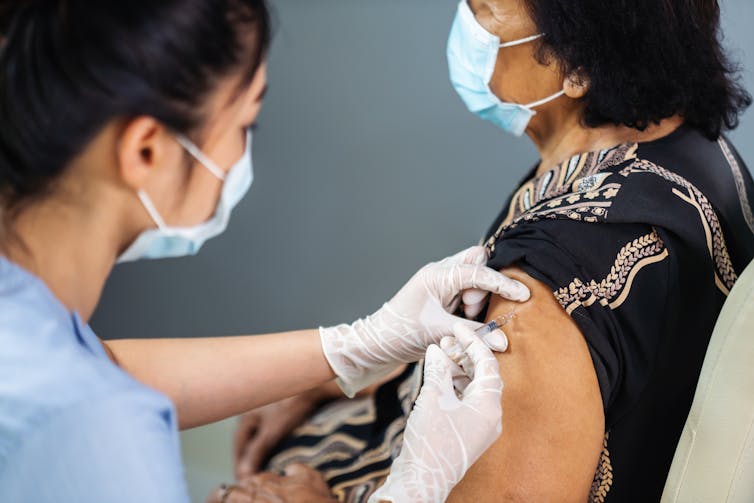You may be able to buy a COVID vaccine ahead of the government rollout. But jumping the queue comes at a price
- Written by Barbara Mintzes, Associate professor, School of Pharmacy and Charles Perkins Centre, University of Sydney
As the world continues to battle COVID-19, the prospect of a vaccine gives us hope of returning to some kind of “normal” in the not too distant future.
The Australian government has signed supply agreements with manufacturers of four COVID vaccines currently in clinical trials. Assuming one or more meets the requirements for safety and effectiveness, everyone will be able to be vaccinated for free.
However, as vaccine supply will be limited at least initially, the government has specified certain groups that will take priority to receive vaccines first. These include people at higher risk of exposure to COVID-19 (such as health-care workers), and those who are more vulnerable to severe disease (such as older people).
At the same time, the head of the Therapeutic Goods Administration (TGA), John Skerritt, has noted manufacturers will also be able to sell vaccines privately:
We live in a free market economy […] There’s nothing stopping companies as long as they have the TGA approval to put that vaccine on the market in Australia.
Read more: 90% efficacy for Pfizer's COVID-19 mRNA vaccine is striking. But we need to wait for the full data
This arrangement reinforces the status quo of Australia’s health system: a public health system with a private market on the side. But COVID is not the status quo. It’s a global public health emergency that has already claimed more than 1.3 million lives.
Allowing people to jump the queue via the private market is a bad idea, for several reasons.
1. A private market puts wealth ahead of need
Those most likely to buy the vaccine privately are those who have not been deemed at high enough risk to receive the vaccine for free until later on, but have the means to do so (we don’t know yet how much it might cost).
Prices are often higher in the private sector because public drug schemes benefit from their size and bargaining power to keep prices low, which could lead vaccine manufacturers to prioritise private sales. If companies set aside a portion of their limited supply for private sales, people who need the vaccine the most, such as health workers and older people, may have to wait longer.
If there are exceptions where people who don’t fall into the priority categories need a vaccine, such as for essential travel to a country that mandates vaccination as a condition of entry, the answer is to build in flexibility through special access requests, not private sales.
 If and when a COVID vaccine becomes available, older people will be towards the front of the queue.
Shutterstock
If and when a COVID vaccine becomes available, older people will be towards the front of the queue.
Shutterstock
2. People buying privately may not get the vaccine they need
Several vaccines may come onto the market, and we don’t yet know if all will be equally effective for everyone. For example, it’s possible a particular vaccine won’t work as well in older people.
The allure of private sales may lead companies to promote their vaccines, in turn affecting which one a patient gets. Drug companies have a long history of intensive marketing to doctors, often casting a wide net in terms of who they suggest might benefit. In the case of the opioid epidemic, these practices have been associated with serious harm to patients.
Companies cannot advertise prescription-only products, including vaccines, to the public in Australia. But they can run unbranded disease awareness campaigns that indirectly promote products to consumers, often through emotional images and appeals.
3. Follow-up may be poorer
COVID vaccine development is moving very quickly, with shorter pre-market testing than a vaccine would normally have. This makes it all the more important to keep careful track of who receives the vaccine, any health problems they experience, and longer-term effectiveness. Uncoordinated private provision creates extra logistical challenges for follow-up.
Read more: Why we should prioritise older people when we get a COVID vaccine
4. Private supply may be impractical
As an example, Pfizer’s mRNA-based vaccine must be stored at -80℃. Special cold chain management is not easy for any provider, but is likely better handled by larger-scale providers set up to deliver COVID vaccines.
Further, all COVID-19 vaccines are likely to require at least two doses. Especially if supply is limited, it may become challenging to make sure private patients get their second dose. And delays or missing the second dose will likely lead to lower effectiveness.
 Allowing people who have the means to purchase a COVID vaccine privately isn’t equitable.
Shutterstock
Allowing people who have the means to purchase a COVID vaccine privately isn’t equitable.
Shutterstock
An issue of equity
Some 40 countries have joined the World Health Organisation’s Solidarity Call to Action to support equitable global access to COVID-19 health technologies. Similarly, the COVAX initiative, which Australia supports, provides direct funding for vaccine access in less advantaged countries.
Echoing the principles of these initiatives, Prime Minister Scott Morrison told the United Nations in September:
[…] it’s a moral responsibility for a vaccine to be shared far and wide. Some might see short-term advantage or even profit, but I assure you, to anyone who may think along those lines, humanity will have a very long memory, and be a very, very severe judge.
Given this moral responsibility, why allow wealthier Australians to jump the queue? The planned public rollout of free COVID-19 vaccines for all is laudable. The main rationale for a parallel private system is “short-term advantage or even profit”, to borrow the prime minister’s words. Let’s not go there.
Read more: Creating a COVID-19 vaccine is only the first step. It'll take years to manufacture and distribute
Authors: Barbara Mintzes, Associate professor, School of Pharmacy and Charles Perkins Centre, University of Sydney





